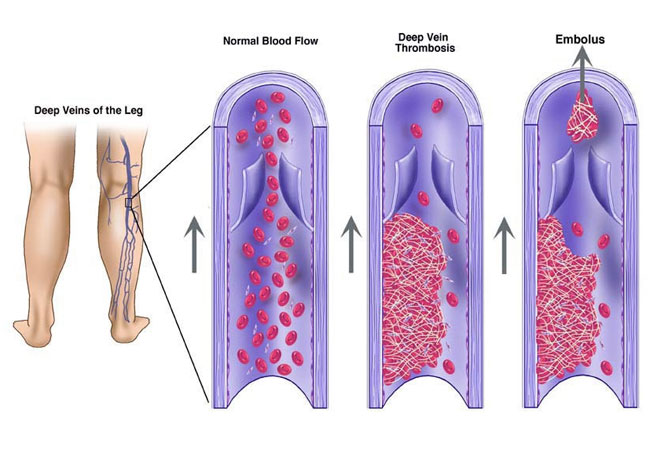Deep Vein Thrombosis (DVT) occurs when a blood clot forms deep in your leg. While blood clots can occur at any time, some individuals are more likely to get DVT. The blood clot that forms deep in a vein in the lower leg or thigh is a deep vein thrombosis.
What is Deep Vein Thrombosis?

What are the Symptoms of DVT?
Symptoms of DVT include:
- Pain
- Swelling
- Warmth in the affected area
- Leg redness
- No symptoms at all, until a more serious condition arises related to the DVT, such as a lung clot, called a pulmonary embolism.
What can Cause the Condition?
If an individual has blood that clots rapidly or easily, they are more likely to get DVT. The only way to notice whether your blood clots more easily (thrombophilia) is if a blood clot occurs. Also, if a person sits for long stages of time, has recently broken a bone or had surgery, or has recently had a long trip where they had to stay seated, they are more apt to develop a blood clot.
Certain Factors can also Make a Person More Prone to Develop DVT:
- Strokes
- Chronic heart disease
- High Blood pressure
- Surgery
- Recent treatment for cancer
- Using oral contraceptives
- Pregnant women
- Hormone therapy pill users
- Smokers
- Individuals over the age of 60

How do You Diagnose Deep Vein Thrombosis?
If you or your loved one suffer from deep vein thrombosis, the first step is to schedule an appointment with our highly esteemed vascular doctor. Dr. Khan will evaluate your medical and medication history thoroughly while reviewing your symptoms. The doctor will also perform a complete physical exam to check for tenderness, swelling, or skin discoloration.
After a physical examination and a review of symptoms, blood tests are performed to detect elevated levels of D-dimer, a clot-dissolving substance found in the blood which may indicate the presence of a clot. Image testing is also performed and it could be one of the following:
- Ultrasound
- CT scan
- MRI scan
What does Testing Consist Of?
These tests help the vascular doctor confirm the diagnosis of deep vein thrombosis. Here is a brief description of what each of the tests involve:
Ultrasound: This is a diagnostic procedure where a transducer (wandlike device) is placed over the area that has a blood clot. The device emits sound waves that travel through the tissue and are reflected back. These waves are transformed into images on a computer. This helps the doctor visualize and determine if there is a clot.
Blood test: Your vein doctor may also order a blood test to check for the levels of D dimer, a substance that is usually elevated in people who have DVT.
Venography: In this procedure, a dye is injected by the doctor to a large vein either in the ankle or foot. An X-ray is then taken to examine the area for clots.
CT/MRI scans: These are advanced imaging techniques that can help the doctor know if there is a clot.
How does Treatment of DVT Take Place?
Treatment of DVT has a focus on preventing enlargement of the vein, preventing the development of another clot, and averting an embolism. An embolism occurs when a clot or piece of plaque breaks loose from its site of origin and travels somewhere else in the body, such as the lungs, heart or brain. An embolism is a life-threatening event that may result in many dangerous consequences, including a stroke or heart attack. There are two basic treatments for DVT: medication and compression.
- Blood thinners are medications that thin the blood and provide easier blood flow. Both pill form and injection form are available.
- Compression stockings are elastic stockings that produce pressure on the veins and keep blood from pooling and clotting.
- Thrombolytics are a form of medicines used to break up the clot and are usually used for extreme cases since they present a risk of sudden bleeding.
- Thrombin Inhibitors interrupt the formation of clotting by inhibiting the enzyme thrombin. They are a popular treatment of choice.
The medical team at VeinGuard Heart & Vascular Center can provide cosmetic and medical treatments through customized plans and supervision. For vein treatment in Fairfax, Virginia, please give us a call or fill out the form provided and we will get back to you as soon as possible.

